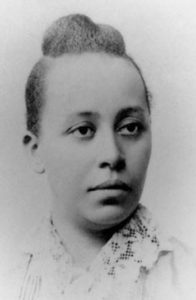
Halle Tanner Dillon Johnson
*Halle Tanner Dillon Johnson was born on this date in 1864. She was a Black doctor.
Born Halle Tanner in Pittsburgh, Pennsylvania, she was the oldest daughter of nine children to Benjamin Tucker and Sarah Elizabeth Tanner. Johnson was well educated and, as a young girl, became familiar with the work of prominent Black intellectuals. She worked with her father on The Christian Recorder, a publication of the African Methodist Episcopal Church, where he ministered.
In 1886, Johnson married Charles Dillon, and the couple had a child before her husband's sudden death. A widow at 24, Johnson returned to live with her family and decided to enter medical school. After three years of study at the Woman's Medical College of Pennsylvania, she earned her M.D. in 1891, graduating with honors. Around the time of her graduation, Booker T. Washington had written to the Woman's Medical College of Pennsylvania to request a nomination for a teaching position he had been struggling to fill for four years. He hoped to find a Black physician to serve the school and its surrounding community. Johnson accepted Washington's offer of $600 monthly, including lodging and meals, and arrived to begin her service in August 1891.
Before beginning her new job, however, young Dr. Dillon faced a significant obstacle: passing the Alabama State Medical Examination. She was sitting for the examination caused a public stir in Montgomery, Alabama. She spent ten days taking the exam, addressing a different area of medicine each day. Her examiners included the directors and leading figures of most of the state's major medical institutions. She passed the test, and Dr. Dillon was the first woman to practice medicine in Alabama.
While at Tuskegee, she was responsible for the health care of the school's 450 students and 30 faculty and staff. She also established a training school for nurses and founded the Lafayette Dispensary to serve the healthcare needs of residents, often mixing medicines herself for their use. She also taught two classes each day. Johnson's tenure at Tuskegee ended in 1894 when she married the Reverend John Quincy Johnson, an African Methodist Episcopal minister, and math instructor at Tuskegee.
The couple moved first to Columbia, South Carolina, where Reverend Johnson became president of Allen University, a private school for Black students. They later moved from Hartford, Connecticut, to Atlanta, Georgia, and then to Princeton, New Jersey, as Reverend Johnson pursued undergraduate and graduate degrees in theology. Finally, in 1900, the couple settled in Nashville, Tennessee, with their three children, and Reverend Johnson became the pastor of Saint Paul A.M.E. Church. Hallie Johnson died in Nashville on April 26, 1901, from complications during childbirth.